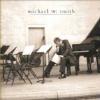| > cMusicWeb.com > Pop > Michael W. Smith > Freedom |
|


[ freedom ]
|
|
|||
|
|
|
|
|
|
THEMUSIC
|
|||
|
|
|||
|
|
|||
|
CURRENTS
|
|||
|
|
|||
|
|
|||
|
SEARCH
|
|||
|
|||
|
|
|||
|
cMUSICMAIL
|
|||
|
|||
|
|
|||
FREEDOM (2000)
 Relying on conductor David Hamilton for original string arrangements, Michael W. Smith forsakes his overdeveloped skill of lyric-writing to stretch his awareness of classical music. Gone are the snappy choruses, often-confectionary phrases, and all other impediments that obscure what Smitty as an artist. Marching-band drums and measured piano chords announce the start of the meritous opener, "Freedom," inspired by a soldier's ponderous return home. The Irish Film Orchestra, prodded by violin soloist David Davidson, handles an "Offering," a title indicative of Freedom's purpose as a spiritual catalyst: to fully know refined glory, one must know the King of glory. At a scant 3:18, "The Giving" passes far too quickly; with such a plaintive, lingering composition, other composers would only be starting the onslaught of key changes, crescendos, and cross harmonies. Smith, recalling his identity as entertainer, goes outside his contact boundaries in "Hibernia," a meshwork of Celtic and modern European jigs that comes off too gaudy. Despite the showiness, Freedom does have it highlights. Light and costly, bright and ghastly, the white-and-black keys of Michael W.'s instrument are caressed craftily in "Letter to Sarah." The album's John Williams (famed Star Wars composer) influence is fleshed out on "Freedom Battle"; from the rhythm reversals, to the clusters of opposing themes, this enjoyably imitative piece needs only George Lucas in the director's chair and Harrison Ford on screen to be complete. A ballroom waltz of delicate designs, "Cry of the Heart," along with its twin track "Prayer for Taylor" integrate the subdominant Yamaha grand piano with the symphonious, expressive labors of the Irish Film Orchestra. Far from losing a classical touch, this natural concord takes listeners to an undiscovered plane where traditional and futurist styles embrace. Track ten held great potential, with its boychoir beginning (an element that MWS has used to rich effect in past albums); but, alas, the "choir" is a synthesized facade, which is what the drum-machine drivel "The Call" digresses to. Whatever logic the keyboardist had for including such a vapid, cut-rate track, it only serves to make listeners thankful for their Cd player's "Skip" button. To tie Freedom to his past work, Michael Smith plunks out his 1984 classic "Thy Word," an overly-churchy turn that restrains the musicians with dull repetition. The finale "Free Man" peals creativity, a duet of real guitar (from Chris Graffignino) and the Smith keyboard's technically-credible guitar sound; one can hardly be distinguished from the other. Winsome photography packages this album of discovery and without-words expression, a landmark in Michael W. Smith's career that trumpets a true musical Freedom.
Relying on conductor David Hamilton for original string arrangements, Michael W. Smith forsakes his overdeveloped skill of lyric-writing to stretch his awareness of classical music. Gone are the snappy choruses, often-confectionary phrases, and all other impediments that obscure what Smitty as an artist. Marching-band drums and measured piano chords announce the start of the meritous opener, "Freedom," inspired by a soldier's ponderous return home. The Irish Film Orchestra, prodded by violin soloist David Davidson, handles an "Offering," a title indicative of Freedom's purpose as a spiritual catalyst: to fully know refined glory, one must know the King of glory. At a scant 3:18, "The Giving" passes far too quickly; with such a plaintive, lingering composition, other composers would only be starting the onslaught of key changes, crescendos, and cross harmonies. Smith, recalling his identity as entertainer, goes outside his contact boundaries in "Hibernia," a meshwork of Celtic and modern European jigs that comes off too gaudy. Despite the showiness, Freedom does have it highlights. Light and costly, bright and ghastly, the white-and-black keys of Michael W.'s instrument are caressed craftily in "Letter to Sarah." The album's John Williams (famed Star Wars composer) influence is fleshed out on "Freedom Battle"; from the rhythm reversals, to the clusters of opposing themes, this enjoyably imitative piece needs only George Lucas in the director's chair and Harrison Ford on screen to be complete. A ballroom waltz of delicate designs, "Cry of the Heart," along with its twin track "Prayer for Taylor" integrate the subdominant Yamaha grand piano with the symphonious, expressive labors of the Irish Film Orchestra. Far from losing a classical touch, this natural concord takes listeners to an undiscovered plane where traditional and futurist styles embrace. Track ten held great potential, with its boychoir beginning (an element that MWS has used to rich effect in past albums); but, alas, the "choir" is a synthesized facade, which is what the drum-machine drivel "The Call" digresses to. Whatever logic the keyboardist had for including such a vapid, cut-rate track, it only serves to make listeners thankful for their Cd player's "Skip" button. To tie Freedom to his past work, Michael Smith plunks out his 1984 classic "Thy Word," an overly-churchy turn that restrains the musicians with dull repetition. The finale "Free Man" peals creativity, a duet of real guitar (from Chris Graffignino) and the Smith keyboard's technically-credible guitar sound; one can hardly be distinguished from the other. Winsome photography packages this album of discovery and without-words expression, a landmark in Michael W. Smith's career that trumpets a true musical Freedom.
- Josh M. Shepherd
Articles written by the staff.
Maintained by WebMaster Dan Ficker.
Site Design by da Man
All Material © 1999-2005 Different Media LLC
Support cMusicWeb.com